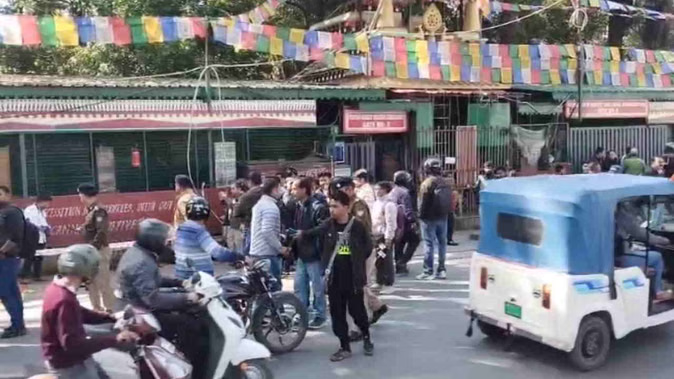A recent leopard attack on a six-year-old boy in Thangar village, Pauri district, has not only raised concerns about safety but also exposed the glaring gaps in the government’s development claims. The child, Kartik, was severely injured by the leopard on September 21 while going out for open defecation, a situation that would not have occurred had the family been provided with a toilet, as claimed by the authorities under the ODF (Open Defecation Free) program.
Kartik is currently receiving treatment at AIIMS Rishikesh, but the incident has brought to light the severe lack of basic amenities in his household. Despite official records stating that Thangar village, and in fact the entire Dwarikhal block, has been declared ODF under the Swachh Bharat Mission and covered under the Saubhagya Yojana for electricity, Kartik’s family remains deprived of both. The family has also not received the benefits of the PM Awas Yojana (PMAY), which aims to provide housing for the poor.
Government Claims vs. Ground Reality
On paper, the government boasts that all households in the block have toilets and are equipped with electricity under its various flagship schemes. However, Kartik’s family, struggling in the absence of these basic necessities, paints a completely different picture. Kartik’s maternal cousin, Neeraj Shah, revealed that Kartik was attacked early in the morning while heading out for open defecation. “If we had a toilet at home, this incident would never have happened,” Neeraj remarked.
Kartik’s father, Mohan Singh, is facing additional financial burden due to the treatment at AIIMS and the rental costs for staying near the hospital. “With my work as a laborer halted and medical expenses rising, it’s becoming extremely difficult to manage,” said Mohan.
No Ayushman Bharat Coverage Due to Aadhaar Issues
Adding to the family’s woes is the fact that Kartik is not eligible for the Ayushman Bharat health scheme due to issues with his Aadhaar card. The family has yet to receive the benefits promised under the scheme, leaving them to bear the brunt of the high medical costs on their own.
Local Officials Acknowledge Gaps
The village head, Sonam Devi, shared some insights into why the family has been left out of key government schemes. “Mohan Singh’s family migrated from Bandela village two generations ago but never registered their land here. Because of this, they couldn’t receive the benefits under PMAY. Additionally, there is a family dispute over electricity connections, despite an electric pole being installed,” she explained. Although Mohan’s father’s name is recorded for a toilet under the Swajal program, it remains unclear whether the funds were ever disbursed or utilized.
Post-Attack Action Taken –
In response to the attack, local authorities have installed three solar lights around Mohan Singh’s home to improve safety in the area. Ravi Saini, Block Development Officer (BDO) of Dwarikhal, confirmed this installation. Meanwhile, the Forest Department has provided the family with an advance compensation of ₹10,000, with the rest to be disbursed after receiving the medical report.
On the electricity front, Mukesh Kumar, SDO of the Satpuli Power Distribution Division, stated, “As soon as we receive a certified application from the Block Development Officer, we will ensure an immediate connection to the affected household.”
DM Orders Investigation
Pauri District Magistrate Dr. Ashish Chauhan has ordered a two-member committee to investigate the lack of basic amenities in the affected household. “Instructions have been given to conduct a detailed inquiry into why the family has no toilet or electricity connection. Further action will be taken once the investigation report is submitted,” said Chauhan.
It’s quite the paradox that Thangar village, along with the entire Dwarikhal block, is proudly declared ODF (Open Defecation Free) on government records, yet young Kartik was attacked while going out for open defecation. Perhaps, the leopard wasn’t informed about the village’s “toilet revolution.” In this era of digital India and gleaming government statistics, it seems that only on paper do toilets magically appear, while on the ground, the jungle (and clearly the wildlife) is still the preferred restroom for many.


